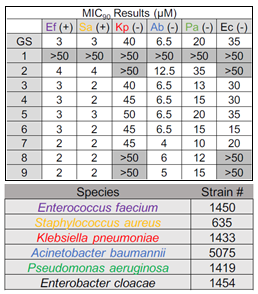Competitive Advantages
- compounds and methods of treating bacterial and fungal infections
- Improved antimicrobial activity
- Reduced toxicity towards human cells
Summary
Gramicidin S (GS) is a naturally occurring β-sheet‑like cyclic decapeptide produced by Bacillus brevis that possesses antimicrobial activity against gram‑positive and gram‑negative bacteria as well as fungi. While GS is very potent it also causes hemolysis of human erythrocytes. Therefore, significant effort has been devoted to improving its selectivity for bacterial over mammalian cells.
Our researchers developed N‑animated analogues of GS. The antimicrobial activity of these analogues was assayed against a panel of drug resistant, gram‑positive, and gram-negative bacteria known as ESKAPE pathogens, and their cytotoxicity was measured using human red blood cells. Several N-aminated analogues not only showed improved antimicrobial activity, but also reduced hemolytic activity relative to GS. These analogues have therefore been shown to efficiently treat gram-positive and gram-negative bacteria, fungi, and multi-drug resistant bacteria. Hence, this technology may prove to be an effective new avenue for the treatment of infections.

Analogues Show Improved Therapeutic Profiles Compared to Gramicidin S (GS)
Desired Partnerships
- License
- Sponsored Research
- Co-Development